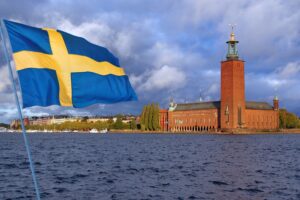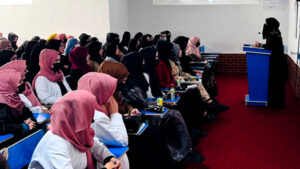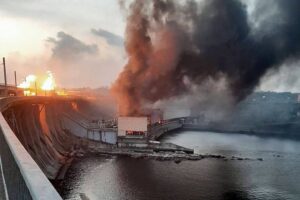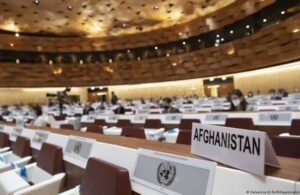KABUL (SW) – Hamid Karzai, the former president of Afghanistan has said that a national discourse is needed to overcome the current crisis in Afghanistan.
Karzai is trying his best to understand Afghanistan’s new rulers. His life is intertwined with theirs, reported the Post.
“I was not sure of my own safety,” Karzai said of his decision to stay in Afghanistan after the Taliban takeover in 2021. “But I would have never left and I will never leave. This is my country.”
For more than a year, Karzai has lived under virtual house arrest at his villa in Kabul, where he sat recently for a candid interview with The Washington Post. The Taliban monitors his every move, he said, and has prevented him from leaving the capital. Yet Karzai has become the Taliban’s most prominent critic inside Afghanistan, demanding that it allow all girls to attend school and create a government that reflects the country’s ethnic diversity.
The Taliban has not heeded his calls. But Karzai’s persistence, and the fact that he has remained in Afghanistan as other political figures have fled, have prompted a reassessment of his legacy, even among Afghans who were highly critical of him during his nearly 13 years in power. Once viewed by many here as an American puppet — lambasted for running a government filled with warlords and marred by corruption — Karzai is now widely applauded for advocating for a more equitable Afghanistan.
“For those people who were afraid of the Taliban, he became an inspiration for them.”
But if Karzai is to be more than a symbol, and to have a meaningful political afterlife, he will need to win the trust of Taliban leaders, many of whom still see him as an adversary.
“Karzai was the first individual who worked with the Americans for the occupation of Afghanistan,” said Abdulhaq Hammad, a senior Taliban official in the Ministry of Information and Culture. “He was leading the occupation. So how can we trust him?”
The collapse of the U.S.-backed government in Afghanistan last year may have appeared sudden, but it was preceded by 20 years of graft and mismanagement. From late 2001 to 2014, Karzai was the face of America’s nation-building project. His critics contend he set the country on the path to ruin.
Despite the influx of billions in international aid, Karzai did little to build up Afghanistan. He also failed to instill a sense of national unity, relying heavily on the support of warlords who consolidated power by stoking ethnic divisions. His rule was also marked by corruption, according to the U.S. watchdog that tracked American reconstruction funds, as his Western and Afghan allies made millions of dollars through shady contracts.
“They had no attachment with Afghanistan and its people,” said Jafar Mahdavi, a former lawmaker who has remained in Kabul. “They came here to collect money and transfer it out of Afghanistan. All these mistakes of Karzai are the cause of the death of the republic.”
Karzai said he took “full responsibility for the corruption and bribes in the delivery of services. … But the big contracts, big corruption, in hundreds of millions of dollars or millions of dollars, was clearly a United States of America thing.”
“The war in Afghanistan was not our war,” Karzai said. “I was not a partner of the United States in that war against Afghan villages and homes. I changed from the moment I recognized that this war that is fought in the name of defeating terrorism is actually a war against the Afghan people.”
“I called the Taliban ‘brothers’ for that reason,” he explained.
But the Taliban always saw Karzai as an enemy.
After the militants took over the capital in 1996, one of their first acts was to torture and kill former Afghan president Mohammad Najibullah, hanging his body from a traffic pole.
When their fighters entered Kabul in August 2021, Karzai feared for his life. He decided to go to the home of Abdullah Abdullah, another senior Afghan politician who had decided to stay.
“I don’t leave my country when it is in trouble,” Karzai said.
But the presidential palace had already been abandoned by the time Taliban fighters arrived. President Ashraf Ghani had fled.
These days, Karzai holds near-daily meetings with Afghan politicians and religious and community leaders, and speaks regularly with U.S., European and U.N. officials.
He often tweets out images of the gatherings at his home, and uses social media to draw attention to the plight of women and girls. Last week, he criticized the Taliban for banning women from Afghan universities. But there are limits to what he can say.
Earlier this year, after the Taliban minister of vice and virtue ordered female newscasters to cover their faces on air, Karzai fired off a tweet encouraging journalists to disobey the order, Waheedi said. When the minister dispatched fighters to his house, Karzai tweeted that there had been a misunderstanding. The original tweet was deleted.
“Karzai is raising his voice, but he’s so careful,” Waheedi said. “He knows the Taliban, what to say and what to not say.”
Karzai acknowledged that he faces pressure from the Taliban, especially the hard-liners. “Some of the leaders come and speak to me very often, and very frank conversations,” Karzai said. “But the relationship is at times tense as well because of what I say, because of what I ask of them.”
Some believe Karzai is biding his time. He has strong relationships with the West, as well as with China, India, Russia and Iran. “These countries are expecting Karzai to stay here and play some role in normalizing relations with Taliban,” Waheedi said. “If there’s any possibility for government change, he would be the person to assemble people around him.”
Karzai’s supporters dismiss this, comparing his role to that of Afghanistan’s former monarch during the 1960s and 1970s, before the Soviet invasion. “In this time, we need him as an elder,” said Akram Khpalwak, a former governor of Farah province and ex-chairman of the Afghan High Peace Council.
Karzai insists he has “no aspirations at all other than being in my own country and getting my children educated.”
Karzai’s ability to speak out, said Hammad, the Taliban official, “represents the patience” of the Taliban, which has given him amnesty even though “he is a criminal responsible for the deaths of hundreds of thousands of Afghans.”
“His criticism of our policies will not bring any changes,” Hammad insisted.
ENDS






